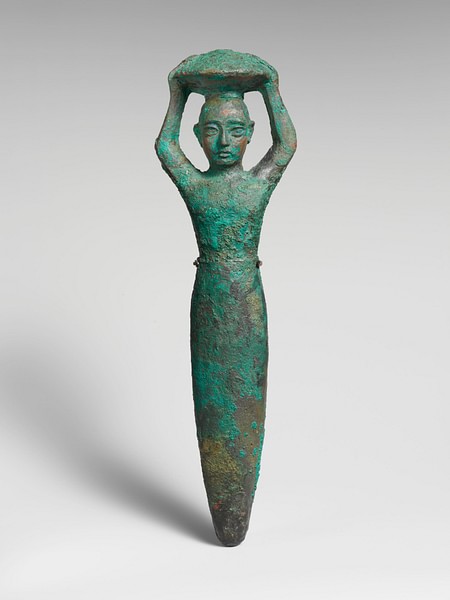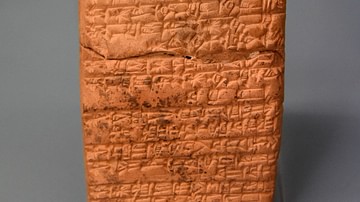Lullaby for a Son of Shulgi is a Sumerian cradlesong from the reign of Shulgi of Ur (2029-1982 BCE) written for one of his sons. The lullaby follows a standard form of encouraging sleep through repetition coupled with the speaker's wishes for the infant's bright future, just like lullabies composed and sung to children today.
The piece is a departure from the majority of Sumerian literary works usually featured in anthologies as it was not composed to honor a deity, event, or a king but is a simple song to be sung to a child at bedtime. The poem is dated to Shulgi's reign, but the names of the mother and child are not known. Shulgi had three wives and six consorts who gave birth to 18 sons and 13 daughters whose names are known (there may have been more), and this piece could have been addressed to any one of the male children. Scholar Samuel Noah Kramer comments:
This unique composition, the only one of its kind thus far known from the Ancient Near East, probably consists entirely of a chant purported to be uttered by the wife of Shulgi, who seems to have been anxious and troubled by the ill health of one of her sons. As is true of lullabies in general, most of the mother's chant is addressed directly to the child, but in several of the preserved passages, she soliloquizes about her son in the third person, and in one passage she addresses Sleep personified. (Sumer, 329)
Scholar Jeremy Black also notes that the work is unique among Mesopotamian literary pieces discovered and translated to date, highlighting its literary style and figurative language and how some of the imagery is reminiscent of works dedicated to Shulgi himself but, even so, as Black writes, "in general, the tone and content of this composition are unparalleled in Sumerian literature" (193). This is not to say that other lullabies were not written or have not been preserved; only that they have not yet come to light or been translated. This work was discovered in the mid-19th century but was not translated until the 1950s.
Background
Shulgi of Ur was the son and successor of Ur-Nammu (r. 2047-2030 BCE), founder of the Third Dynasty of Ur in Sumer. After his father died in battle with the Gutians, Shulgi assumed the throne, drove the Gutians from the land, and built upon the foundation set by his father of initiating programs and policies to improve the lives of his subjects.
He either issued or upheld his father's law code, the Code of Ur-Nammu, built roads, established roadside inns with gardens and running water, encouraged trade, and was a great patron of the arts, reforming the scribal schools and making literacy a priority. His interest in literature and the arts is reflected in the many written works of the so-called Sumerian Renaissance, the rebirth of Sumerian culture, initiated by his father but which flourished under his reign. It is hardly surprising, then, that a lullaby written in a highly literary style should come from the time of Shulgi of Ur.
Ur-Nammu was highly regarded as a Sumerian king and immortalized in the poem The Death of Ur-Nammu, but Shulgi had many literary works dedicated to him, of which A Praise Poem of Shulgi is only one of the most famous. The lullaby to one of Shulgi's sons fits neatly with this practice, which seems to have become quite commonplace under his reign, of composing literary verse in praise of the king, but, as noted, this piece is unique in that the poet's skills are brought to bear in a short work to be sung to one of his sons. Which son that may have been, or which of Shulgi's wives might have sung it, is unknown, as Jeremy Black explains:
The names of three wives of Shulgi are known: Taram-Uram, his first wife and the mother of Amar-Suen, who was to succeed Shulgi as king; Amat-Suen, whom Shulgi married during the middle of his long reign; and Shulgi-simti, whom he married around his twenty-ninth year of kingship and who remained his queen until the end of his life. In addition to his three wives, Shulgi had at least six 'consorts' who did not have the full rank of queen. Altogether, the names of eighteen sons and thirteen daughters of Shulgi are known. (193)
It is possible that the child is Amar-Suen, the firstborn of Taram-Uram, as later children may not have received the same level of attention, but this suggestion is speculative. The lullaby could have been written for any of Shulgi's sons. Other textual evidence, however, especially toward the end, suggests the piece was written when Taram-Uram was queen and is here shown addressing Amar-Suen.

Summary
The two standard translations of the text come from Kramer and Black. Kramer's is more literary and prettier, while Black's is sparse and often considered more faithful to the original language. The poem begins with the unidentified speaker's wish that a "he" will grow strong and stable, and it is not until lines 10-11 that the subject is identified as the speaker's son and the speaker as his mother. The mother references her ururu-chant which Kramer identifies as, possibly, a song of joy, but the meaning of ururu is not known.
It seems, however, that the ururu-chant might be a kind of magical conjuring during which the speaker/singer manifests a hoped-for outcome – such as were used by Sumerian physicians in treating patients – and at the beginning of the poem, the mother is simply wishing a bright future for her son before moving to her wish that he would sleep (lines 12-23). In lines 24-30, the mother promises him treats like cheeses that will heal and "well-watered lettuce", suggesting the child might be ill.
Lines 31-38 imagine the boy's future with a wife and son of his own, all three of them happy together – again a kind of conjuring of a hopeful future – but lines 39-48 make clear that the son is ill. She sees her son as having died of his illness and mourned by the lizards and flies which, it is assumed, would have been about the room, as well as by professional keeners. The reference to the "man of the wall" is unclear as is who is being referred to as "who makes sprout woe," but both may be an allusion to death. The mother banishes all thoughts of illness and misfortune, however, as she calls upon the ururu-chant (which Black translates as "lullaby") to make her child and herself flourish and thrive.
In the final lines of the poem, the mother returns to the imaginings of the future of her son with his wife, watched over by Ashnan (also given as Ezina-Kusu), the goddess of grain who assumed the responsibility for agricultural growth after the earlier goddess of grain, Nisaba, became the patron deity of writers. Kramer ends his translation with the mother's wish for happy years and bright feasts but then adds:
The remainder of the poem is very fragmentary and obscure, but toward the end the mother seems to turn once again to her son, the future king, and admonishes him to stand by the cities of Ur and Uruk, to seize and pinion the enemy, a dog who, unless cowed, will tear him to pieces. (331)
These end lines, given by Black, also suggest the speaker is Taram-Uram and the child Amar-Suen as it is possible that the "enemy" referenced is the Gutians, who were often referred to as "dogs" who needed to be put down. The other imagery of the concluding lines also points to the Gutians as "the enemy," which would date the composition close to the beginning of Shulgi's reign.
The Text
The following passage is taken from The Literature of Ancient Sumer, translated by Jeremy Black et al. Kramer's translation follows, taken from History Begins at Sumer. Ellipses indicate missing words or sentences, and question marks point to the possibility of another translation for a word.
Black's Translation:
1-5: Ah, ah, may he grow sturdy through my crooning, may he flourish through my crooning! May he put down strong foundations as roots, may he spread branches wide like a sakir plant!
6-11: Lord, from this you know our whereabouts; among those resplendent apple trees overhanging the river, may someone who passes by (?) reach out his hand, may someone lying there raise his hand. My son, sleep will overtake you, sleep will settle on you.
12-18: Sleep come, sleep come, sleep come to my son, sleep hasten (?) to my son! Put to sleep his open eyes, settle your hand upon his sparkling eyes – as for his murmuring tongue, let the murmuring not spoil his sleep.
19-23: May he fill your lap with emmer while I sweeten miniature cheeses for you, those cheeses that are the healer of mankind, that are the healer of mankind, and of the lord's son, the son of lord Shulgi.
24-30: In my garden, it is the lettuces that I have watered, and among the lettuces it is the gakkul lettuce that I have chopped. Let the lord eat this lettuce! Through my crooning let me give him a wife, let me give him a wife, let me give him a son! May a happy nursemaid chatter with him, may a happy nursemaid suckle him!
31-38: Let me ... a wife for my son, and may she bear him a son so sweet. May his wife lie in his warm embrace, and may his son lie in his outstretched arms. May his wife be happy with him, and may his son be happy with him. May his young wife be happy in his embrace, and may his son grow vigorously on his gentle knees.
39-48: You are restless – I am troubled, I am quite silent (?), gazing at the stars, as the crescent moon shines on my face. Your bones might be arrayed on the wall! The man of the wall might shed tears for you! The mongoose might beat the balaj drums for you! The gecko might gouge its cheeks for you! The fly might gash its lips for you! The lizard might tear out (?) its tongue for you!
49-56: May the lullaby (?) make us flourish! May the lullaby (?) make us thrive! When you flourish, when you thrive, when you ... the shaking of churns, sweet sleep ..., the sweet bed ...
2 lines fragmentary57-63: May a wife be your support, and may a son ... May a son be your fortune. May winnowed grain be your lover, and may Ezina-Kusu (the goddess of grain) be your aid. May you have an eloquent protective goddess. May you be brought up to a reign of favourable days. May you smile upon festivals.
64-66: My son is ...; he knows nothing. He does not know the length of his old age (?). He does not know the dwelling of the ...
67-73: May you discover ... May you eat ...
3 lines fragmentary
May you be ... May you be ...74-91: 7 lines fragmentary
... goats, sheep and donkeys ...
1 line fragmentary
Ninkasi (the goddess of beer) ... in her vat ...
5 lines fragmentary
The shepherd's wife ... He ... the ... of the date palm. He brings date shoots among the offerings.92-114: As for you, lie in sleep! May your palm tree, extending its fronds, spread joy like a fig tree (?). Place coals (?) beside Urim! Place charcoal beside Unug! Seize the enemy's mouth like ...! Bind his arms like reed bundles! Make the enemy cower before you, lest he rip open your back like a sack,
4 lines fragmentary
approx. 6 lines missing
4 lines fragmentary
unknown no. of lines missing
Kramer's Translation:
1-5: U-a a-u-a (pronounced oo-a a-oo-a)
In my ururu-chant – may he grow big
In my ururu-chant – may he grow large,
Like the irina-tree may he grow stout of root,
Like the shakir-plant may he grow broad of crown.
6-11: The Lord (perhaps Sleep) ...,
Among its burgeoning apple trees, by the river arrayed,
He (Sleep?) will spread his hand over him who is ...
He will lift his hand over him who is lying down,
My son, sleep is about to overtake you,
Sleep is about to settle over you.
12-18: Come Sleep, come Sleep,
Come to where my son is,
Hurry (?) Sleep to where my son is,
Put to sleep his restless eyes,
And as for his babbling tongue,
Let not the babbling tongue shut out his sleep.
19-23: He (Sleep) will fill your lap with emmer,
I-I will make sweet for you the little cheeses,
Those little cheeses that are the healer of man,
The healer of man, Oh son of the lord,
Oh, son of the lord Shulgi!
24-30: My garden is lettuce well-watered,
It is gakkul-lettuce well cultivated (?),
Let the lord eat that lettuce
In my ururu-song – I will give him a wife
I will give him a wife, I will give him a son,
The nursemaid, joyous of heart, will converse with him,
The nursemaid, joyous of heart, will suckle him.
31-38: I – I will take a wife for my son,
She will bear him a son so sweet,
The wife will lie on his burning lap,
The son will lie in his outstretched arms,
The wife will be happy with him,
The son will be happy with him,
The young wife will rejoice in his lap,
The son will grow big on his sweet knee.
39-48: You are in pain,
I am troubled by it,
I am struck dumb, I gaze at the stars,
The new moon shines white on my face:
Your bones will be arrayed on the wall,
The “man of the wall” will shed tears for you,
The keeners will pluck the lyres for you,
The gecko will gash the cheek for you,
The fly will pluck the beard for you,
The lizard will bite (?) its tongue for you.
49-56: Who makes sprout woe, will make it sprout all about you,
Who spreads about woe, will spread it all about you (other lines fragmentary)
57-63: May the wife be your support,
May the son be your lot,
May the winnowed barley be your bride,
May Ashnan, the Kusu-goddess, be your ally,
May you have an eloquent guardian angel,
May you achieve a reign of happy days,
May feasts make bright your forehead.
64-114: (very fragmentary)
Conclusion
Lines 39-48 may be an example of magical conjuring, as noted – in which illness and death are brought to the fore only to be banished – or could be a mother's teasing along the lines of "Go to sleep now or the little night goblins will get you" and then telling her son that he would only be mourned by flies, lizards, and people paid for that service. Both Kramer and Black note that the piece is difficult to translate owing to its poor state of preservation and multiple possibilities in translating certain concepts.
If the poem is read as being sung by Taram-Uram to Amar-Suen, there were no doubt happy days and feasts, but her fate is unknown – she would have died c. 2009 BCE or earlier – and his reign was short (1982-1973 BCE) and focused largely on military campaigns suppressing revolts and holding back the Elamites. He died in his 9th year as king from a scorpion bite and left no heir as he was succeeded by his brother, Shu-Sin (r. 1973-1964 BCE), best known from The Love Song for Shu-Sin, the world's oldest love poem.
In the lullaby, though, Amar-Suen – if he is the "son of Shulgi" referenced – is a small child, perhaps an infant, and his future is uncertain and as wide open to possibilities as that of his parents. The lullaby preserves a single moment in which the boy is being sung to sleep by his mother who loves him and wishes only the best for him, just like any mother and her child today; and there they remain, in that moment, unchanged and unchanging after over 4,000 years.






